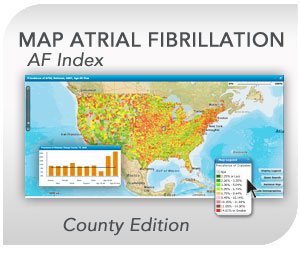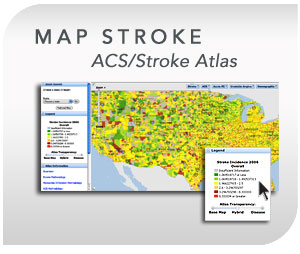Stroke Reports
Thursday, February 27th, 2014

AHA: February 12, 2014 Because stroke is among the leading causes of death, disability, hospitalizations, and healthcare expenditures in the United States, there is interest in reporting outcomes for patients hospitalized with acute ischemic stroke. The American Heart Association/American Stroke Association, as part of its commitment to promote high-quality, evidence-based care for cardiovascular and stroke […]
Stroke Reports
Thursday, February 27th, 2014

AHA: February 12, 2014 Study Highlights: Stroke hospitalization and death rates may be associated with changes in environmental temperature and dew point. Large daily temperature changes and higher average dew points may be linked with higher stroke hospitalizations. Embargoed until 7:30 a.m. PT/ 10:30 a.m. ET Wednesday, Feb. 12, 2014. This news release is featured […]
Stroke Reports
Thursday, February 27th, 2014

AHA: February 12, 2014 Study Highlights: Cocaine greatly increases ischemic stroke risk in young adults within 24 hours of use. Stroke risk associated with acute cocaine use is much higher than other stroke risk factors, such as diabetes, high blood pressure and smoking. Enbargoed until 7:30 a.m. PT/10:30 a.m. ET Wednesday, Feb. 12, 2014. This […]
Stroke Reports
Thursday, February 27th, 2014

Ahajournals: January 30, 2014 Background and Purpose—There are uncertainties surrounding the optimal management of patients with brain swelling after an ischemic stroke. Guidelines are needed on how to manage this major complication, how to provide the best comprehensive neurological and medical care, and how to best inform families facing complex decisions on surgical intervention in deteriorating […]
Stroke Reports
Thursday, February 27th, 2014

CIRCOUTCOMES: January 14, 2014 Each year in the United States, approximately 800 000 men and women are affected by stroke, which equates to one incident of stroke every 40 seconds.1 Stroke is the fourth leading cause of death nationally and is one of the foremost contributors to functional disability.2 The cost to the US healthcare system is substantial. […]
Stroke Reports
Friday, February 7th, 2014

American Heart Association: 1/23/14 Physical fitness is low after stroke and this may cause or exacerbate some common poststroke problems, including disability. It is not known whether physical fitness training after stroke reduces death, disability, or dependency. Objectives The primary aims of this review1 were to determine whether physical fitness training (cardiorespiratory training and resistance training) […]
Stroke Reports
Friday, February 7th, 2014

STROKEAHA: January 16, 2014 ntravenous thrombolysis with tissue plasminogen activator (tPA) is the only therapy proven to improve outcome in ischemic stroke. Studies of intravenous thrombolysis show that response to therapy is time-dependent; the sooner the patients receive tPA, the better the chance of good outcome.1 The required brain imaging before tPA administration delays the initiation of […]
Stroke Reports
Friday, February 7th, 2014

STROKEAHA: January 7, 2014 Current guidelines advocate intravenous thrombolysis for patients with ischemic stroke <4.5 hours from onset without additional imaging beyond noncontrast computed tomography (CT) of the brain.1 Rapid administration of intravenous tissue-type plasminogen activator (IV-tPA) will reduce disability. Treatment of patients within 3 hours has an odds ratio of 1.53 (95% confidence interval, 1.26–1.86) for […]
Stroke Reports
Friday, February 7th, 2014

STROKEAHA: December 19, 2013 Atrial fibrillation (AF) in the presence of mitral stenosis, a consequence of rheumatic heart disease, was long recognized as the basis for cerebral infarction. Although it had long been acknowledged that atrial stasis resulting from mitral stenosis, often in the presence of AF, predisposed to thrombus formation, investigators questioned whether the AF […]
Stroke Reports
Friday, February 7th, 2014

Mary Ann Liebert: November 27, 2013 Background: While knowledge of cardiovascular disease (CVD) has improved, it remains low among minority women, thereby contributing to disparities and posing health challenges. Moreover, substantial numbers of women do not recognize that excess weight imposes CVD risk and increases morbidity and decreases survival. In order to test the hypothesis that CVD […]



































